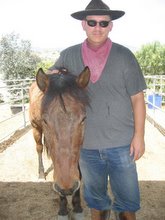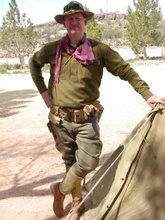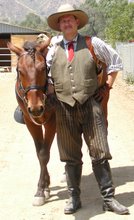Some thoughts on the old "Infantry vs Cavalry" debate:
1) Horsemanship- The state of horsemanship was abysmal. For the most part, there was no formal instruction and it was up to the individual companies to train. With motivated/competant officers and NCOs, results could be achieved in time but to a great degree, training was of the character of "on the job", especially if the company was going on campaign (before departing, companies were reinforced with new recruits, some who had just barely enlisted).
2) Logistics- A good part of the horse's normal garrison ration was grain. Out in the field, supplies were spotty and for the most part the horses depended on grazing the local grass. After three or four weeks of campaigning, horses frequently broke down and if nothing else, lost a lot of weight. The horse breeds used by the Indians were far more hardy and capable of subsisting on a lot less. In fact, it could be argued that the march rates after three or four weeks were actually more favorable for infantry.
The reality was that for the most part, the cavalry was incapable of catching up with Indian war parties, who operated mostly in the Spring and Summer. The key strategy that Miles employed was the winter campaign when forage for the horses was hard to find and limited food supplies. Snow and severe rain limited mobility and especially with the women and children. Basically the Indian villages were "fixed" during the winter, making them a target. Miles basically gutted the Sioux with the 5th Infantry in the Fall of 1876/Winter of 1877.
IMHO, much of what we see and hear of the infantry vs cavalry debate is tainted by a combination of officers attempting to save their careers and justify their actions after-the-fact and later with Hollywood movies and just plain BS. The record is fairly mixed and I believe that both cavalry and infantry were essential, cavalry to provided a wide-ranging "presence" and the infantry to act as the proverbial "rock" to anchor a campaign.
1) Horsemanship- The state of horsemanship was abysmal. For the most part, there was no formal instruction and it was up to the individual companies to train. With motivated/competant officers and NCOs, results could be achieved in time but to a great degree, training was of the character of "on the job", especially if the company was going on campaign (before departing, companies were reinforced with new recruits, some who had just barely enlisted).
2) Logistics- A good part of the horse's normal garrison ration was grain. Out in the field, supplies were spotty and for the most part the horses depended on grazing the local grass. After three or four weeks of campaigning, horses frequently broke down and if nothing else, lost a lot of weight. The horse breeds used by the Indians were far more hardy and capable of subsisting on a lot less. In fact, it could be argued that the march rates after three or four weeks were actually more favorable for infantry.
The reality was that for the most part, the cavalry was incapable of catching up with Indian war parties, who operated mostly in the Spring and Summer. The key strategy that Miles employed was the winter campaign when forage for the horses was hard to find and limited food supplies. Snow and severe rain limited mobility and especially with the women and children. Basically the Indian villages were "fixed" during the winter, making them a target. Miles basically gutted the Sioux with the 5th Infantry in the Fall of 1876/Winter of 1877.
IMHO, much of what we see and hear of the infantry vs cavalry debate is tainted by a combination of officers attempting to save their careers and justify their actions after-the-fact and later with Hollywood movies and just plain BS. The record is fairly mixed and I believe that both cavalry and infantry were essential, cavalry to provided a wide-ranging "presence" and the infantry to act as the proverbial "rock" to anchor a campaign.












No comments:
Post a Comment